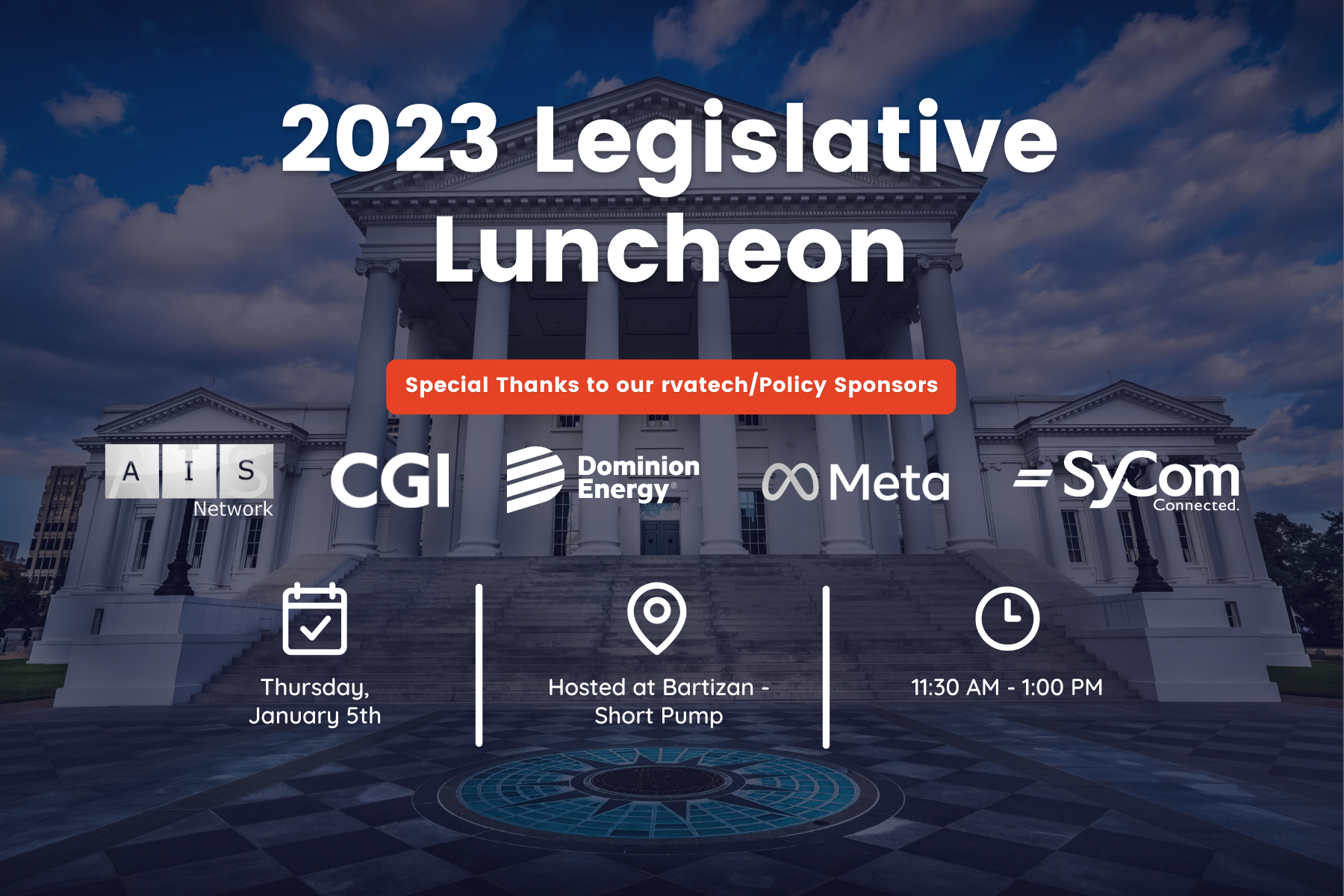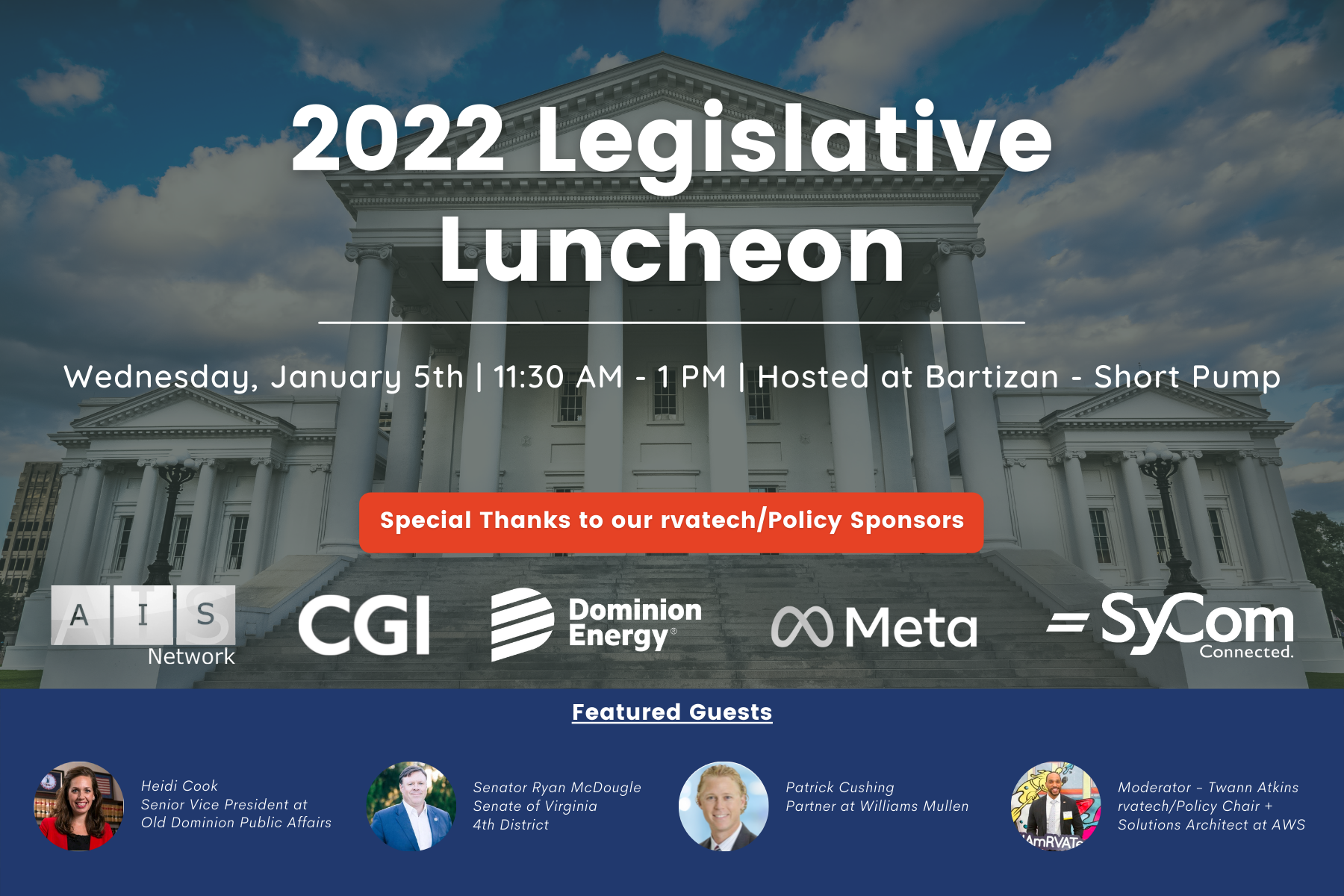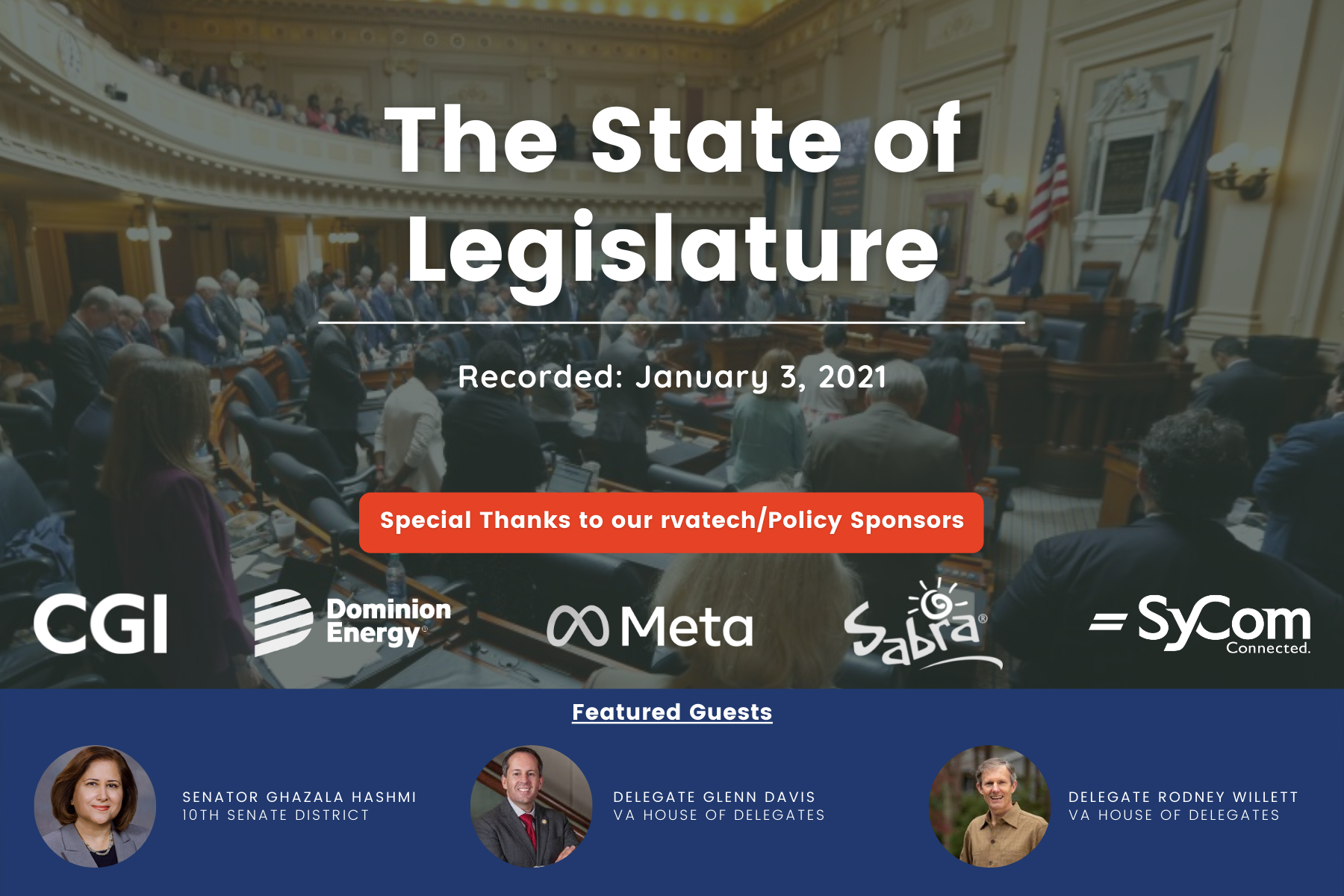Catch up on the latest policy updates at the 2024 Legislative Luncheon
About the Event
Join the #rvatech community for an exclusive look inside the 2024 general assembly. Hear from a panel of local lawmakers about where our technology ecosystem currently stands and where it’s hoping to go.
Event Details
Wednesday, April 10 | 11:30 AM – 1:00 PM
Hosted at Bartizan – Short Pump
4035 Whittall Way, Glen Allen, VA 23060

Policy Wins
Today
January 1, 2020
Virginia Innovation Partnership Authority
RVATech supported successful efforts in 2019 and 2020 to create a consolidated entity to bring together various technology and startup based economic development programs and resources. This new entity will align programs previously at the Center for Innovative Technology and other agencies to oversee and support research, development, and commercialization, as well as related investment and seed-stage funding. The Authority will be headquartered in Richmond and play an active role in developing Virginia’s innovation ecosystem in all regions of the Commonwealth. This effort continued progress made in 2017 through legislation that strengthened the Virginia Research Investment Committee and its role in research and commercialization.
January 1, 2020
Limitation of Liability Reforms in IT Procurement
Over the course of several years, RVATech has worked with stakeholders to reform and improve how VITA and other state agencies handle liability in IT contracting. Legislation passed in 2016 moved liability matters to the negotiation phase of a procurement, and then legislation passed in 2019 finally placed a 2x limitation on liability for the vendor in a Major IT Project with some exceptions.
January 1, 2019
Tech Talent Investment Program
In 2019, we supported legislation to create the tech talent investment program that significantly increased the number of computer science graduates from Virginia colleges and universities in all regions of the Commonwealth. The legislation provided the framework for an additional 25,000 degrees by 2039 in computer science, computer engineering, and other closely related fields. This landmark legislation will grow our tech talent pipeline and help Virginia remain competitive for growing our technology industry.
January 1, 2019
Protecting Data Center Tax Incentives
Virginia's tax incentives for data centers has put us on the map as one of the top locations in the world for data centers, further growing our local technology sector. While some elected officials have wanted to reduce or eliminate those incentives in recent years, RVATech and other advocates have successfully protected them to benefit our industry. We supported efforts to extend the incentives through 2035 during the 2016 session.
January 1, 2018
Broadband Deployment Funding
Every year, RVATech advocates for increasing access to high speed internet both in urban and rural areas of Virginia. Our modern economy requires it in order for students to learn and businesses to grow. Through the Virginia Telecommunication Initiative, we have successfully advocated for funding to expand broadband access across Virginia, including an additional $70 million in funding for the 2020-2021 biennium.
January 1, 2016
Computer Science Teacher Training and K12 Curriculum
In recent years, RVATech has supported successful legislation and funding to boost K12 teacher training in computer science, to incorporate computer science education into the general curriculum, and to give students more options for meeting advanced degree requirements through computer science education.
January 1, 2015
Lighthouse Labs Seed Funding
RVATech worked with the General Assembly to secure funding in the state budget that helped launch Lighthouse Labs into the premier seed stage accelerator in Virginia.
January 1, 2014
Expansion of Technology Supporting R&D Tax Credits
RVATech supported successful efforts to expand the Research and Development tax credits that help recruit technology jobs to Virginia. These credits have been widely utilized by companies large and small to expand their footprint in Virginia, the majority of which has been in technology related jobs. Legislation was approved in 2014 and again in 2020 to increase their capacity in the Commonwealth.
1990
Note From Policy Specialist Andrew Lamar
The 2022 session of the Virginia General Assembly convened on January 12th. The was the first legislative session for Governor Glenn Youngkin and a new House Republican majority, led by Speaker Todd Gilbert. The Senate is unchanged from last year, and Senate Democrats still hold a 21-19 majority. Roughly 2100 pieces of legislation were introduced in the House and Senate combined. The General Assembly adjourned as scheduled on March 12th, but with some unfinished business. A few dozen bills were carried over to a forthcoming special session, along with the new biennial budget. House and Senate negotiators had not finished their work by the deadline, so they decided to adjourn and come back at a later date, which has now been scheduled to resume on April 4th. In addition to the special session for the budget and remaining bills, the House and Senate are scheduled to reconvene on April 27th to vote on suggested amendments from Governor Youngkin and any vetoes.
This session, representatives from rvatech were involved in supporting a variety of initiatives related to the Policy Agenda as adopted last December. We were successful in passing legislation to support STEM education, increasing funding for work-based learning, investing more in workforce training programs, preserving Virginia’s status as a top state to invest in data centers, increasing funding for the Innovation Partnership Authority’s Regional Innovation Fund, increasing tech-industry input at VITA, allocating an additional $50 million into broadband deployment, and making tremendous new investments in state and local government cybersecurity. The House budget allocates roughly $150 million in cybersecurity upgrades at the state and local levels, and the Senate proposal is very similar. Many of these items will be finalized in the coming weeks, and we will keep you up to date when they are resolved.








